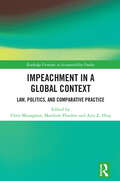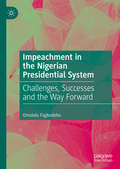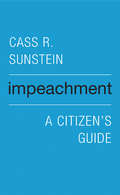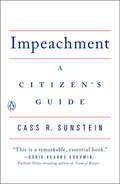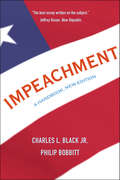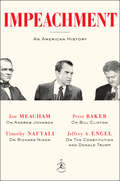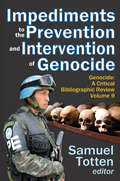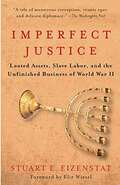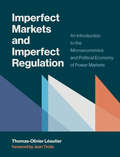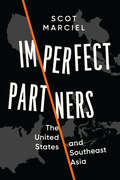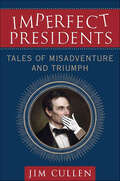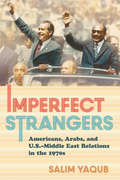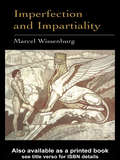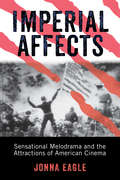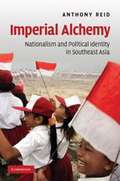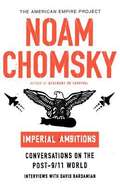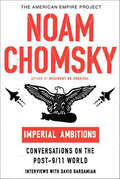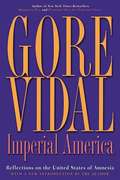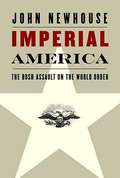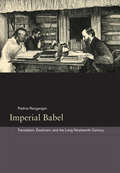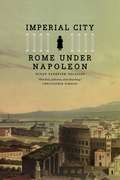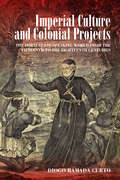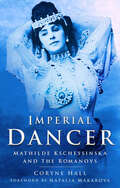- Table View
- List View
Impeachment in a Global Context: Law, Politics, and Comparative Practice (Routledge Frontiers in Accountability Studies)
by Aziz Z. Huq Chris Monaghan Matthew FlindersThis volume considers the use of impeachment within a global context. The book brings together leading scholars and experts to give an insight into significant periods in the development of impeachment and its modern comparative use. Divided into five parts, the opening chapter introduces the topic and underlines its significance in terms of understanding the relationship and inter-dependence among politics, governance and the law. It also offers a novel conceptual framework that facilitates the global mapping of impeachment processes. Part I presents a thematic approach that explores the topic of impeachment through the lenses of democracy, human rights and the rule of law. With these themes in mind, Part II focuses on those parts of the world where impeachment is generally recognised as a core constitutional process including the United States, South Korea, Brazil and other countries in South America. Part III continues with the process of constitutional mapping by moving to a focus on those countries where impeachment is arguably an important but largely secondary or peripheral process. This includes chapters on Denmark, Iceland, Sri Lanka and the Philippines and flows through into Part IV’s focus on areas of the world where impeachment matters and may even be increasing in terms of visibility but, for a number of reasons, arguably exists within a satellite status in terms of constitutional processes and safeguards. The fifth and final section steps back in an attempt to assess impeachment processes from a broad comparative perspective. The collection presents the definitive text on impeachment for students and scholars with an interest in comparative public law, politics and constitutional studies.
Impeachment in the Nigerian Presidential System: Challenges, Successes and the Way Forward
by Omololu FagbadeboThis book explores the politics associated with the exercise of the legislative power of impeachment as intended by the drafters of the Constitution in Nigeria. It interrogates the exercise of the power of impeachment with reference to the intended purpose and examines its failures in the cases of impeachment in the country. It analyzes the interplay of power in the governing institutions in Nigeria’s political system, which involved the understanding of a web of interactions among elites within a political structure relating with others outside its sphere of operation. It presents an analysis of the politics associated with impeachment within the framework of the activities of different political actors operating in different political structures assigned to perform certain statutory roles in the political system. The book shows how the selective use of impeachment provisions as instrument of political vendetta and harassment has weakened the potency of this oversight power of the legislature thereby engendering accountability problem in the Nigerian presidential system.
Impeachment: A Citizen's Guide
by Cass R. Sunstein“Sunstein has written the story of impeachment every citizen needs to know. This is a remarkable, essential book.” — Doris Kearns Goodwin As Benjamin Franklin famously put it, Americans have a republic, if we can keep it. Preserving the Constitution and the democratic system it supports is the public’s responsibility. One route the Constitution provides for discharging that duty—a route rarely traveled—is impeachment. Cass R. Sunstein provides a succinct citizen’s guide to an essential tool of self-government. He illuminates the constitutional design behind impeachment and emphasizes the people’s role in holding presidents accountable. Despite intense interest in the subject, impeachment is widely misunderstood. Sunstein identifies and corrects a number of misconceptions. For example, he shows that the Constitution, not the House of Representatives, establishes grounds for impeachment, and that the president can be impeached for abuses of power that do not violate the law. Even neglect of duty counts among the “high crimes and misdemeanors” delineated in the republic’s foundational document. Sunstein describes how impeachment helps make sense of our constitutional order, particularly the framers’ controversial decision to install an empowered executive in a nation deeply fearful of kings. With an eye toward the past and the future, Impeachment: A Citizen’s Guide considers a host of actual and imaginable arguments for a president’s removal, explaining why some cases are easy and others hard, why some arguments for impeachment have been judicious and others not. In direct and approachable terms, it dispels the fog surrounding impeachment so that Americans of all political convictions may use their ultimate civic authority wisely.
Impeachment: A Citizen's Guide
by Cass R. Sunstein“With insight, wisdom, affection, and concern, Sunstein has written the story of impeachment every citizen needs to know. This is a remarkable, essential book.” —Doris Kearns GoodwinAn essential guide to the impeachment process that rises above politics and goes beyond punditry, from one of America's foremost legal experts, including analysis of the Mueller Report.As Benjamin Franklin famously put it, Americans have a republic, if we can keep it. Preserving the Constitution and the democratic system it supports is the public's responsibility. One route the Constitution provides for discharging that duty--a route rarely traveled--is impeachment.Harvard Law professor Cass R. Sunstein provides a succinct citizen's guide to this essential tool of self-government. Taking us deeper than mere partisan politics, he illuminates the constitutional design behind impeachment and emphasizes the people's role in holding presidents accountable. In spite of the loud national debate between pundits and politicians alike over whether or not to impeach Trump, impeachment remains widely misunderstood. Sunstein identifies and corrects a number of common misconceptions. For example, he shows how the Constitution, not the House of Representatives, establishes grounds for impeachment, and that the president can be impeached for abuses of power that do not violate the law. Even neglect of duty counts among the "high crimes and misdemeanors" delineated in the republic's foundational document. Sunstein describes how impeachment helps make sense of our constitutional order, particularly the framers' controversial decision to install an empowered executive in a nation deeply fearful of kings.With an eye toward the past and the future, Impeachment: A Citizen's Guide considers a host of actual and imaginable arguments for a president's removal, explaining why some cases are easy and others hard, why some arguments for impeachment have been judicious and others not. And with an appendix on the Mueller report, it puts the current national debate in its proper historical context. In direct and approachable terms, it dispels the fog surrounding impeachment so that Americans of all political convictions may use their ultimate civic authority wisely.
Impeachment: A Handbook
by Philip Bobbitt Charles L. BlackCharles L. Black Jr.’s classic guide to presidential impeachment, now in an updated edition with new material by Philip Bobbitt Originally published at the height of the Watergate crisis and reissued in 1998, two months before the second impeachment of a U.S. president, Charles Black’s Impeachment became the premier guide to the subject of presidential impeachment. Now thoroughly updated, it is essential reading for every concerned citizen.
Impeachment: An American History
by Jon Meacham Peter Baker Jeffrey A. Engel Timothy NaftaliFour experts on the American presidency examine the three times impeachment has been invoked—against Andrew Johnson, Richard Nixon, and Bill Clinton—and explain what it means today.Impeachment is a double-edged sword. Though it was designed to check tyrants, Thomas Jefferson also called impeachment “the most formidable weapon for the purpose of a dominant faction that was ever contrived.” On the one hand, it nullifies the will of voters, the basic foundation of all representative democracies. On the other, its absence from the Constitution would leave the country vulnerable to despotic leadership. It is rarely used, and with good reason. Only three times has a president’s conduct led to such political disarray as to warrant his potential removal from office, transforming a political crisis into a constitutional one. None has yet succeeded. Andrew Johnson was impeached in 1868 for failing to kowtow to congressional leaders—and, in a large sense, for failing to be Abraham Lincoln—yet survived his Senate trial. Richard Nixon resigned in August 1974 after the House Judiciary Committee approved three articles of impeachment against him for lying, obstructing justice, and employing his executive power for personal and political gain. Bill Clinton had an affair with a White House intern, but in 1999 he faced trial in the Senate less for that prurient act than for lying under oath about it. In the first book to consider these three presidents alone—and the one thing they have in common—Jeffrey A. Engel, Jon Meacham, Timothy Naftali, and Peter Baker explain that the basis and process of impeachment is more political than legal. The Constitution states that the president “shall be removed from Office on Impeachment for, and Conviction of, Treason, Bribery, or other high Crimes and Misdemeanors,” leaving room for historical precedent and the temperament of the time to weigh heavily on each case. This book reveals the complicated motives behind each impeachment—never entirely limited to the question of a president’s guilt—and the risks to all sides. Each case depended on factors beyond the president’s behavior: his relationship with Congress, the polarization of the moment, and the power and resilience of the office itself. This is a realist view of impeachment that looks to history for clues about its potential use in the future.
Impediments to the Prevention and Intervention of Genocide (Genocide: A Critical Bibliographic Review Ser.)
by Samuel TottenAcademics, NGOs, the United Nations, and individual nations are focused on the prevention and intervention of genocide. Traditionally, missions to prevent or intervene in genocide have been sporadic and under-resourced. The contributors to this volume consider some of the major stumbling blocks to the avoidance of genocide. Bartrop and Totten argue that realpolitik is the major impediment to the elimination of genocide. Campbell examines the lack of political will to confront genocide, and Theriault describes how denial becomes an obstacle to intervention against genocide. Loyle and Davenport discuss how intervention is impeded by a lack of reliable data on genocide violence, and Macgregor presents an overview of the influence of the media. Totten examines how the UN Convention on Genocide actually impedes anti-genocide efforts; and how the institutional configuration of the UN is itself often a stumbling block. Addressing an issue that is often overlooked, Travis examines the impact of global arms trade on genocide. Finally, Hiebert examines how international criminal prosecution of atrocities can impede preventive efforts, and Hirsch provides an analysis of the strengths, weaknesses, and effectiveness of major international and national prescriptions developed over the last decade. The result is a distinguished addition to Transaction's prestigious Genocide Studies series.
Imperfect Justice: Looted Assets, Slave Labor, and the Unfinished Business of World War II
by Elie Wiesel Stuart EizenstatImperfect Justice is Stuart Eizenstat's personal account of how the Holocaust became a political and diplomatic battleground fifty years after the war's end, as the issues of dormant bank accounts, slave labor, confiscated property, looted art, and unpaid insurance policies convulsed Europe and America. His story is not one of easy successes or an idyllic view of justice. Rather, it is a revealing chronicle of high-stakes negotiations involving heads of European governments, played out on an international stage in an emotionally charged atmosphere, with a subtext of crimes against humanity and billions of dollars on the table. <p><p>Eizenstat recounts the often heated negotiations with the Swiss, the Germans, the French, the Austrians, and various Jewish organizations, showing how moral and legal issues shunted aside for so long, exposed wounds that had never healed and conflicts that had never been properly resolved. Each country responded in its own way: Switzerland fought the disclosures about its past and deeply resented the outside pressure it faced; Germany accepted that it was once again called upon to account for its wartime sins, this time for those committed by private industry; Austria was torn, seeing itself as both victim and collaborator with Hitler; and France courageously accepted national responsibility for the Vichy regime. And on the other side of the table were a remarkable cast of characters: class-action lawyers, some of whom were altruistic while others were as interested in their own press clippings as in serving the needs of the survivors they represented; Jewish organizations that were at each other's throats over who best represented the victims in their quest for justice; politicians with their own agendas and ambitions, including New York's colorful Senator Alfonse D'Amato, who turned the issue into his own personal crusade; and the President of the United States, Bill Clinton.
Imperfect Markets and Imperfect Regulation: An Introduction to the Microeconomics and Political Economy of Power Markets (The\mit Press Ser.)
by Thomas-Olivier LeautierThe first textbook to present a comprehensive and detailed economic analysis of electricity markets, analyzing the tensions between microeconomics and political economy.The power industry is essential in our fight against climate change. This book is the first to examine in detail the microeconomics underlying power markets, stemming from peak-load pricing, by which prices are low when the installed generation capacity exceeds demand but can rise a hundred times higher when demand is equal to installed capacity. The outcome of peak-load pricing is often difficult to accept politically, and the book explores the tensions between microeconomics and political economy. Understanding peak-load pricing and its implications is essential for designing robust policies and making sound investment decisions. Thomas-Olivier Léautier presents the model in its simplest form, and introduces additional features as different issues are presented. The book covers all segments of electricity markets: electricity generation, under perfect and imperfect competition; retail competition and demand response; transmission pricing, transmission congestion management, and transmission constraints; and the current policy issues arising from the entry of renewables into the market and capacity mechanisms. Combining anecdotes and analysis of real situations with rigorous analytical modeling, each chapter analyzes one specific issue, first presenting findings in nontechnical terms accessible to policy practitioners and graduate students in management or public policy and then presenting a more mathematical analytical exposition for students and researchers specializing in the economics of electricity markets and for those who want to understand and apply the underlying models.
Imperfect Partners: The United States and Southeast Asia
by Scot MarcielImperfect Partners is a unique hybrid – part memoir, part foreign policy study of U.S. relations with Southeast Asia, a critically important region that has become the central arena in the global U.S.-China competition. From the People Power revolt in the Philippines to the opening of diplomatic relations with Vietnam, from building a partnership with newly democratic Indonesia to responding to genocide in Myanmar and coups in Thailand, Scot Marciel was present and involved. His direct involvement and deep knowledge of the region, along with his extensive policymaking work in Washington, allows him to bring to life the complexities and realities of key events and U.S. responses, along with rare insights into U.S. foreign policy decisionmaking and the work of American diplomats in the field.
Imperfect Presidents: Tales of Misadventure and Triumph
by Jim CullenWhen people make bad decisions, odd remarks, and just plain silly mistakes, the results are sure to haunt them. But when these things happen to the president of the United States, they can change the course of history. In this clever portrait of the American presidency, Jim Cullen takes ten presidents down from their pedestals by examining key missteps in their careers--and how they transcended them. Examples include Abraham Lincoln smearing a preacher and rediscovering his religious vision in emancipating slaves; Lyndon Johnson's electoral fraud in his 1948 Senate race and his role in the signing of the Voting Rights Act; and Ronald Reagan's subversion of the Constitution in the Iran-Contra affair and affirmation of world peace in helping bring about the end of the Cold War. Targeting Republicans and Democrats alike, Cullen's insights are surprisingly timely and hugely entertaining.
Imperfect Strangers: Americans, Arabs, and U.S.–Middle East Relations in the 1970s
by Salim YaqubIn Imperfect Strangers, Salim Yaqub argues that the 1970s were a pivotal decade for U.S.-Arab relations, whether at the upper levels of diplomacy, in street-level interactions, or in the realm of the imagination. In those years, Americans and Arabs came to know each other as never before. With Western Europe's imperial legacy fading in the Middle East, American commerce and investment spread throughout the Arab world. The United States strengthened its strategic ties to some Arab states, even as it drew closer to Israel. Maneuvering Moscow to the sidelines, Washington placed itself at the center of Arab-Israeli diplomacy. Meanwhile, the rise of international terrorism, the Arab oil embargo and related increases in the price of oil, and expanding immigration from the Middle East forced Americans to pay closer attention to the Arab world.Yaqub combines insights from diplomatic, political, cultural, and immigration history to chronicle the activities of a wide array of American and Arab actors—political leaders, diplomats, warriors, activists, scholars, businesspeople, novelists, and others. He shows that growing interdependence raised hopes for a broad political accommodation between the two societies. Yet a series of disruptions in the second half of the decade thwarted such prospects. Arabs recoiled from a U.S.-brokered peace process that fortified Israel’s occupation of Arab land. Americans grew increasingly resentful of Arab oil pressures, attitudes dovetailing with broader anti-Muslim sentiments aroused by the Iranian hostage crisis. At the same time, elements of the U.S. intelligentsia became more respectful of Arab perspectives as a newly assertive Arab American community emerged into political life. These patterns left a contradictory legacy of estrangement and accommodation that continued in later decades and remains with us today.
Imperfection and Impartiality: A Liberal Theory Of Social Justice
by Marcel L.J. WissenburgThis text argues, from a liberal perspective, for a radical re- interpretation of existing ideas concerning social justice. Since the 1980s there has been debate between liberals and their critics, Concerning The Use Of Impartiality As A Notion On Which To Base Social theories of justice. In introducing an impartial standard of the right, the implications are often sexist, anthropocentric, capitalistic and oppressive. Wissenberg argues that this does not mean we should abandon the ideal of impartiality and defends the thesis that impartiality and the liberal project can be saved.; The book explores a liberal theory of Justice That Takes The Core Notion Of Impartiality Seriously; That Takes account of moral pluralism without trying to downgrade it or reduce it to the rank of a secondary problem; that argues for principles of justice Respecting Individual Notions Of The Good Life Rather Than Reformulating them in terms of one universal measure of the good or the right; that cherishes plurality, diversity and tolerance instead of uniformity and moral indifference.
Imperial Affects: Sensational Melodrama and the Attractions of American Cinema
by Jonna EagleImperial Affects is the first sustained account of American action-based cinema as melodrama. From the earliest war films through the Hollywood Western and the late-century action cinema, imperialist violence and mobility have been produced as sites of both visceral pleasure and moral virtue. Suffering and omnipotence operate as twinned affects in this context, inviting identification with an American national subject constituted as both victimized and invincible—a powerful and persistent conjunction traced here across a century of cinema.
Imperial Alchemy
by Anthony ReidThe mid-twentieth century marked one of the greatest watersheds of Asian history, when a range of imperial constructs were declared to be nation-states, either by revolution or decolonisation. Nationalism was the great alchemist, turning the base metal of empire into the gold of nations. To achieve such a transformation from the immense diversity of these Asian empires required a different set of forces from those that Europeans had needed in their transitions from multi-ethnic empires to culturally homogeneous nations. In this book Anthony Reid explores the mysterious alchemy by which new political identities have been formed. Taking Southeast Asia as his example, Reid tests contemporary theory about the relation between modernity, nationalism, and ethnic identity. Grappling with concepts emanating from a very different European experience of nationalism, Reid develops his own typology to better fit the formation of political identities such as the Indonesian, Malay, Chinese, Acehnese, Batak and Kadazan.
Imperial Ambitions: Conversations on the Post-9/11 World
by Noam Chomsky David Barsamian[From the book cover] Timely, illuminating, and urgently needed, this volume of interviews conducted by award-winning radio journalist David Barsamian features Noam Chomsky discussing U.S. policies in the increasingly unstable post-9/11 world. In these exchanges, appearing for the first time in print, Chomsky offers his frank, provocative, and informed views on the invasion and occupation of Iraq, the doctrine of preemptive strikes against so-called rogue states, and the growing threat to international peace posed by the U.S. drive for domination. In his inimitable style, Chomsky also dissects the propaganda system that fabricates a mythic past and airbrushes inconvenient facts out of history.
Imperial Ambitions: Conversations on the Post-9/11 World (The American Empire Project)
by Noam ChomskyIn this first collection of interviews since the bestselling 9-11, our foremost intellectual activist examines crucial new questions of U.S. foreign policyTimely, urgent, and powerfully elucidating, this important volume of previously unpublished interviews conducted by award-winning radio journalist David Barsamian features Noam Chomsky discussing America's policies in an increasingly unstable world. With his famous insight, lucidity, and redoubtable grasp of history, Chomsky offers his views on the invasion and occupation of Iraq, the doctrine of "preemptive" strikes against so-called rogue states, and the prospects of the second Bush administration, warning of the growing threat to international peace posed by the U.S. drive for domination. In his inimitable style, Chomsky also dissects the propaganda system that fabricates a mythic past and airbrushes inconvenient facts out of history.Barsamian, recipient of the ACLU's Upton Sinclair Award for independent journalism, has conducted more interviews and radio broadcasts with Chomsky than has any other journalist. Enriched by their unique rapport, Imperial Ambitions explores topics Chomsky has never before discussed, among them the 2004 presidential campaign and election, the future of Social Security, and the increasing threat, including devastating weather patterns, of global warming. The result is an illuminating dialogue with one of the leading thinkers of our time—and a startling picture of the turbulent times in which we live.
Imperial America: Reflections on the United States of Amnesia
by Gore VidalGore Vidal has been described as the last 'noble defender" of the American republic. In Imperial America, Vidal steals the thunder of a right wing America--those who have camouflaged their extremist rhetoric in the Old Glory and the Red, White, and Blue--by demonstrating that those whose protest arbitrary and secret government, those who defend the bill of rights, those who seek to restrain America's international power, are the true patriots. "Those Americans who refuse to plunge blindly into the maelstrom of European and Asiatic politics are not defeatist or neurotic," he writes. "They are giving evidence of sanity, not cowardice, of adult thinking as distinguished from infantilism. They intend to preserve and defend the Republic. America is not to be Rome or Britain. It is to be America. "
Imperial America: The Bush Assault on the World Order
by John NewhouseIn the aftermath of September 11, 2001, most of the world was ready to accept American leadership in a war against terrorism. Yet within a year the United States was estranged from its allies and enmeshed in a costly and increasingly deadly occupation of Iraq, while virtually ignoring potentially great threats from other parts of the world. In this measured but forcefully argued book, the distinguished foreign correspondent John Newhouse shows what went wrong. Timely, knowledgeable, and filled with vivid portraits of such figures as George W. Bush, Tony Blair, Donald Rumsfeld, and Dick Cheney, Imperial America is an indispensable book.
Imperial Babel: Translation, Exoticism, and the Long Nineteenth Century
by Padma RangarajanAt the heart of every colonial encounter lies an act of translation. Once dismissed as a derivative process, the new cultural turn in translation studies has opened the field to dynamic considerations of the contexts that shape translations and that, in turn, reveal translation’s truer function as a locus of power. In Imperial Babel, Padma Rangarajan explores translation’s complex role in shaping literary and political relationships between India and Britain.Unlike other readings that cast colonial translation as primarily a tool for oppression, Rangarajan’s argues that translation changed both colonizer and colonized and undermined colonial hegemony as much as it abetted it. Imperial Babel explores the diverse political and cultural consequences of a variety of texts, from eighteenth-century oriental tales to mystic poetry of the fin de siecle and from translation proper to its ethnological, mythographic, and religious variants.Searching for translation’s trace enables a broader, more complex understanding of intellectual exchange in imperial culture as well as a more nuanced awareness of the dialectical relationship between colonial policy and nineteenth-century literature. Rangarajan argues that while bearing witness to the violence that underwrites translation in colonial spaces, we should also remain open to the irresolution of translation, its unfixed nature, and its ability to transform both languages in which it works.
Imperial City: Rome Under Napoleon
by Susan Vandiver NicassioIn 1798, the armies of the French Revolution tried to transform Rome from the capital of the Papal States to a Jacobin Republic. For the next two decades, Rome was the subject of power struggles between the forces of the Empire and the Papacy, while Romans endured the unsuccessful efforts of Napoleon's best and brightest to pull the ancient city into the modern world. Against this historical backdrop, Nicassio weaves together an absorbing social, cultural, and political history of Rome and its people. Based on primary sources and incorporating two centuries of Italian, French, and international research, her work reveals what life was like for Romans in the age of Napoleon. "A remarkable book that wonderfully vivifies an understudied era in the history of Rome. . . . This book will engage anyone interested in early modern cities, the relationship between religion and daily life, and the history of the city of Rome. "--Journal of Modern History "An engaging account of Tosca's Rome. . . . Nicassio provides a fluent introduction to her subject. "--History Today "Meticulously researched, drawing on a host of original manuscripts, memoirs, personal letters, and secondary sources, enabling [Nicassio] to bring her story to life. "--History
Imperial Culture and Colonial Projects: The Portuguese-Speaking World from the Fifteenth to the Eighteenth Centuries
by Diogo Ramada CurtoBeyond the immeasurable political and economic changes it brought, colonial expansion exerted a powerful effect on Portuguese culture. And as this book demonstrates, the imperial culture that emerged over the course of four centuries was hardly a homogeneous whole, as triumphalist literature and other cultural forms mingled with recurrent doubts about the expansionist project. In a series of illuminating case studies, Ramada Curto follows the history and perception of major colonial initiatives while integrating the complex perspectives of participating agents to show how the empire’s life and culture were richly inflected by the operations of imperial expansion.
Imperial Dancer: Mathilde Kschessinska and the Romanovs
by Coryne Hall Natalia MakarovaThe vivacious Mathilde Kschessinska (1872-1971) was the mistress of three Russian Grand Dukes and the greatest ballerina of her generation. As a young girl, she had enjoyed romantic troika rides, and passionate nights, with the future Tsar Nicholas II. When their relationship ended Mathilde began simultaneous affairs with Nicholas's cousin, Grand Duke Sergei and Grand Duke Andrei Vladimirovich. When her son was born in 1902 nobody knew for certain the identity of the father - except that he was undoubtedly a Romanov. In ballet, she partnered the great Vaslav Nijinsky, became a force to be reckoned with in the Imperial Theatre and, later in life, taught Margot Fonteyn.Mathilde Kschessinska is mentioned in almost every book about the Romanovs but so many myths surround her that she has become the stuff of legend. It is said a hoard of Romanov treasure lies buried under her house in St Petersburg and that a secret passage connected her home to the Winter Palace. Even her own memoirs, published in the 1960s, are as much fantasy as reality. The real story, which this book will reveal, lies in what Mathilde did not say.
Imperial Debris: On Ruins and Ruination
by Stoler Ann LauraImperial Debris redirects critical focus from ruins as evidence of the past to "ruination" as the processes through which imperial power occupies the present. Ann Laura Stoler's introduction is a manifesto, a compelling call for postcolonial studies to expand its analytical scope to address the toxic but less perceptible corrosions and violent accruals of colonial aftermaths, as well as their durable traces on the material environment and people's bodies and minds. In their provocative, tightly focused responses to Stoler, the contributors explore subjects as seemingly diverse as villages submerged during the building of a massive dam in southern India, Palestinian children taught to envision and document ancestral homes razed by the Israeli military, and survival on the toxic edges of oil refineries and amid the remains of apartheid in Durban, South Africa. They consider the significance of Cold War imagery of a United States decimated by nuclear blast, perceptions of a swath of Argentina's Gran Chaco as a barbarous void, and the enduring resonance, in contemporary sexual violence, of atrocities in King Leopold's Congo. Reflecting on the physical destruction of Sri Lanka, on Detroit as a colonial metropole in relation to sites of ruination in the Amazon, and on interactions near a UNESCO World Heritage Site in the Brazilian state of Bahia, the contributors attend to present-day harms in the occluded, unexpected sites and situations where earlier imperial formations persist. Contributors. Ariella Azoulay, John F. Collins, Sharad Chari, E. Valentine Daniel, Gastón Gordillo, Greg Grandin, Nancy Rose Hunt, Joseph Masco, Vyjayanthi Venuturupalli Rao, Ann Laura Stoler
Imperial Defence, 1868-1887 (Cass Series: Naval Policy and History #Vol. 12)
by Donald MacKenzie SchurmanThe technical transformation of the Royal Navy during the Victorian era posed many design, tactical and operational problems for administrators from the 1830s onwards. The switch from sail to steam required the creation of a system of defended coaling stations and a greater infrastructure.
